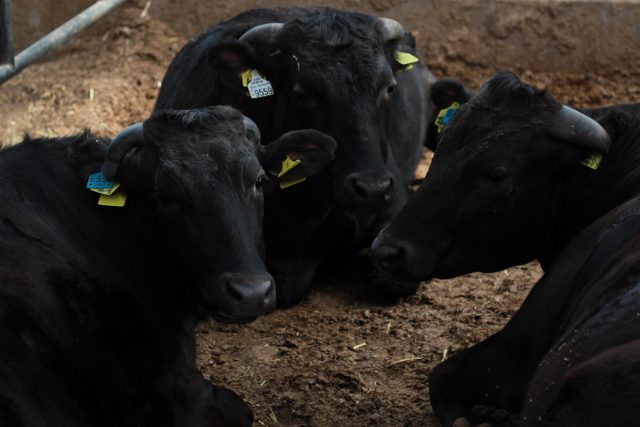Type the name of the breed you're looking for below
[wpdreams_ajaxsearchlite] Don't see the breed your're looking for? Click here and let us know!
Wagyu cattle
| Place of Origin | Japan |
| Origin | Japan: Because of Japan's rugged terrain and isolated areas, different breeding and feeding techniques were used such as massaging or adding beer or sake to their feeding regimen. It is suggested that this was done to aid in digestion and induce hunger during humid seasons, but it appears to have no effect on the meat's flavor. Massaging may have been introduced to prevent muscle cramping on small farms in Japan where the animals did not have sufficient room to use their muscles. There are four breeds of wagyu: Japanese Black (黒毛和種 Kuroge washu), Japanese Brown (赤毛和種 Akage Washu or Akaushi), Japanese Polled (無角和種 Mukaku Washu ), and Japanese Shorthorn (日本短角和種 Nihon Tankaku Washu ). Wagyu cattle's genetic predisposition yields a beef that contains a higher percentage of omega-3 and omega-6 fatty acids than typical beef. The increased marbling also increases the ratio of monounsaturated fats to saturated fats. Japanese Black makes up 90% of all fattened cattle in Japan. Strains of Japanese Black include Tottori, Tajima, Shimane and Okayama. Japanese Brown, also known as Japanese Red, is the other main breed; strains include Kochi and Kumamoto. Japanese Shorthorn makes up less than one percent of all cattle in Japan. Australia: The Australian Wagyu Association is the largest breed association outside Japan. Both fullblood and Wagyu-cross cattle are farmed in Australia for domestic and overseas markets, including Taiwan, China, Hong Kong, Singapore, Indonesia, the U.K., France, Germany, Denmark and the U.S. Australian Wagyu cattle are grain fed for the last 300–500 days of production. Wagyu bred in Western Australia's Margaret River region often have red wine added to their feed as well. United States; In the United States, Japanese Wagyu cattle were bred with Angus cattle. This crossbreed has been named American Style Kobe Beef. Wagyu were first competitively exhibited at the National Western Stock Show in 2012. Some U.S. Wagyu breeders have full blooded animals directly descended from original Japanese bloodlines, and are registered through the American Wagyu Association. Canada; Wagyu cattle farming in Canada appeared after 1991 when the Canadian Wagyu Association was formed. Wagyu style cattle and farms in Canada are found only in Alberta, Ontario and Prince Edward Island. Canadian Wagyu beef products are exported to the U.S., Australia, New Zealand, Hawaii and Europe. Scotland; The firm Highland Wagyu was established in 2011 and is based at Blackford Farms in Dunblane, Scotland. The company acquired a herd of 300 Wagyu cattle to add to its existing herd of 250 in July 2013 and became the largest producer of Fullblood Wagyu beef in the UK with plans to make Scotland the Wagyu centre of Europe. |
| Purpose | High quality beef production |
| Appearance | Varies |
| Horns | Varies |
| Cows Average Weight | Varies |
| Bulls Average Weight | Varies |
| Other Considerations | Wagyu (和牛 Wagyū, literally "Japanese cow") is any of several breeds of cattle, the most desired of which is genetically predisposed to intense marbling and to producing a high percentage of oleaginous unsaturated fat. The meat from such wagyu cattle is known for its quality, and commands a high price. In several areas of Japan, wagyu beef is shipped carrying area names. Some examples are Kobe, Mishima, Matsusaka, Ōmi, and Sanda beef. |



